A Taste of Angling in Somerset
Richard Blackie, Somerset Gazette Columnist
For over 40 years I have fished all over the British Isles, in fact all over the World, as for the first 14 years of my working life I was a sailor. This job took me to every corner of the globe, and I took every opportunity to get ashore and fish.
I have caught tiger fish in the Malayan Jungle, shark off the beaches of Australia, barracuda in Bermuda, fresh water bass in the rivers of the USA. So when I got married and wrapped in my sea going life a decision had to be made as to where to settle down and live. As my wife is a Somerset girl it was decided that Somerset would be the base of our new home. As for fishing it was a decision I have never regretted, as this county is awash with great fishing and places to fish.
When I was on shore leave I stayed with my mother in London and I thought nothing of a two hundred mile round trip drive to fish the Trent or Norfolk Broads. Now I consider a 20 mile drive to be distance fishing!
Over the past 10 years commercial fisheries have come into their own in this County, with year round good fishing for most species (although on some waters carp predominate). As an example how well stocked these fisheries are, some even hold Sturgeon, a fish that twenty years ago was so rare in this country that any caught had to be offered to the Queen(Emerald pool has lots of this species).
Around my home town of Taunton there are four good commercial fisheries that are well worth a visit. The first is Fishponds House which is about mid-way between Taunton and Honiton. The three lakes that are there (only two can be fished) are among this countries' oldest stew ponds. They were originally built by the monks to hold carp for food. Now the monks have gone but a good head of carp remain. Apart from the carp there is a very good head of roach, rudd, bream and tench. The top pool is the biggest, and ranges in depth from five to twelve feet. Best fishing is in summer, although 60 to 70 pound nets are not uncommon in winter. In summer the top lake fishes well in most pegs. In winter, it is best to fish the deeper swims. The smaller pool is very weedy, but tremendous sport can be had with small carp and silver fish. The best swims to fish on this pool are those at the end furthest away from the house. Best baits on both pools are maggots, corn, meat, casters and bread. Fishing one of these baits over a bed of hemp is good for carp. A lot of fun can be had on a warm summers evening with floating crust.
Next we visit Follyfoot Farm which is between Taunton and Bridgwater. This three acre lake is heavily stocked with Koi, common and mirror carp. Although most of these carp are on the smallish side, but there are plenty of double figure fish. Most of the usual baits will catch, although maggots will pull mostly small carp. One day I watched an angler having good sport with carp between 8 and l0lb dog biscuits. Like most commercial fisheries you may only use barbless hooks on this water.
HBS Fisheries, which is also just off the Taunton to Bridgwater road, is another fishery well worth a visit. HBS is made up of two pools, one for specimen fishing and the other which they call the match pool. The specimen pool is stocked with large carp which are caught regularly on various baits, boilies are probably the most successful. Fishing to features or stalking fish are two top methods on this pool. The smaller match pool has carp up to 17lb, although most are in the 8oz to 2lb bracket. There are also some quality roach, tench and the odd surprise fish like the 5.5lb bream my friend caught there last week. For one-a-chuck catch rate maggots are the top bait whereas for the better specimens worm, corn and boilies are tops.
Just the other side of Bridgwater we come to Dunwear lakes where carp and bream feature heavily in this four lake mixed fishery. Apart from the bream and carp there is good all round sport with perch and roach. The north lake, at three and a half acres, holds six known 20lb plus carp, and is heavily stocked with tench. This and the south lake are waters for the specialist carp angler. The south lake, which has produced a 31lb specimen, also has double figure carp which are most frequently taken on boilies. No junior anglers are allowed on the 18 acre seniors lake where swims are cut into the undergrowth. Carp to 30lb are present but rarely caught. Expect mostly commons in the 6 to 9lb range. Roach and rudd show to maggot and caster and bream have provided several 100lb plus bags to feeder with maggot and worm. The two and a half acre railway lake has roach, bream from 4 to 5lb, tench, perch and carp from 8oz to 1lb and has been developed primarily as a beginners water. The corner with the tall reeds is a hotspot and maggots will catch most species Corn tempts bream and perch to 2lb are in all pools. There is disabled access.
Avalon Fisheries, at Westhay, is a 17 acre, two lake complex set among peat workings. Number one lake has 50 pegs and averages eight feet in depth. Number two has 20 pegs, and is of a similar depth. Both pools are well stocked with bream, roach, rudd. tench, perch and carp. Number one has also been stocked with barbel. Both pools have recently been heavily stocked with bream. Be aware that boilies, nuts, bloodworm and joker are banned. Best baits for carp are corn, luncheon meat and bread.
Thorney Lakes, Nr Muchelney Langport, is an established coarse fishery that spans two acres and averages three and a half feet in depth. There is a good head of carp, tench, roach, rudd and bream, which most anglers fish for with pole, using ether corn, meat, maggot or caster. Best pegs are on the island. Shelf life boilies and cereal groundbaits are banned. This is another water where floating crust does well in summer.
We now move across to Wedmore to one of the best kept fisheries I have ever seen. The name of this haven for angling is Lands End Farm Fishery. There are two lakes there; Tadham, which is the specimen lake, and Tealham, the match lake. All the swims on both lakes have rubbish and fag end bins. Tealham lake has a big (and I mean big) platform in every swim and both lakes are heaving with fish. Tadham contains Commons, mirror and ghost carp from 5lb to 22lb, grass carp to 16lb and bream to 8lb. Tealham is stocked with common and mirror carp, tench, golden tench, crucians, ide, roach, rudd, perch, golden orfe, chub, bream and barbel. Best baits are maggot and corn which are best fished on a long pole close to the island or between the pegs close to the bank. This fishery has good paths leading up to the swims (wellies not needed).There is a good car park and toilets and I personally highly recommended this venue.
At West Huntspill near Highbridge there is a fishery called Emerald Pool. This one and a half acre pool is a family run coarse fishery that boasts big, big catches and a hundred pound net of fish is common. Species include carp up to the mid twenties, bream, perch, roach, golden orfe, rudd, barbel, and sturgeon up to four feet long! Most of the swims have concrete platforms to fish from, the car park is right next to the pool and there is a toilet on site. Most of the usual baits score, although pellets are one of the best. There is disabled friendly holiday accommodation available at this fishery.
Back to Bridgwater now and the Sedges. This fishery was once a brickworks and has two pools, one three and a half acres, the other two and a half acres, with both having an average depth of eight feet. The Tile Pool has carp in the low doubles, and the Brick Pool is stocked with carp to 25lbs and also contains crucians over 2.5lb. Other stock in these ponds includes lots of skimmers and bream from 5 to 7lb, tench to 9lb, roach and rudd to llb, big eels and a good head of perch with specimens up to 2lb. Boilies are good for carp throughout the season but in the summer months corn and meat are the tops for this species. Maggots catch lots of small fish and hemp is good for roach. This fishery is disabled friendly, in fact the 45 platforms on these pools will accommodate wheelchairs. Unhooking mats MUST be used.
Staying around Bridgwater we move to Westhay Lake which is between Westhay and Shapwick. This three and a half acre lake was originally dug for peat and its main species is carp (mirrors and commons) which go up to the mid thirties. There are also superb crucians which go up to 3.5lb, tench to 4lb, roach and rudd to 1lb, perch and goldfish. 50 to 60 Ib nets are common. For carp. boilies or tiger nuts fished over a bed of hemp works well. Use maggot for smaller fish and pegs 10 and eleven are known hot spots. Carp anglers must have an unhooking mat and no bent or barbed hooks are allowed. There are no pike or bream in this water.
These are just a few of the commercial stillwater fisheries available to anglers. There are plenty more, and this article just gives a taste of the fishing on offer. Browsing the adverts and the directory in the Get Hooked guide will give you information on ALL of them.
Apart from the fisheries above there are a multitude of rivers in this county that offer excellent fishing. The river Tone in Taunton, which has free fishing between the top of French Weir down to the end of the Market car park. The Tone at French Weir, especially above the weir, gives really good sport with a big head of chub, quality roach, bream, grayling and trout. Maggot is a good bait for most of the species although I have caught some thumping big chub on elderberries. The river just below the weir gives a lot of small fish, and this area is popular with youngsters. Between the weir and Priorybridge (the start of the market car park) gives mostly small fish, but be aware there are a number of big carp in this section and the market car park gives some good bream and roach catches. If you accidently catch a grayling or trout (and you will at French Weir) don't put them in your keepnet as you will need a national game licence to do this.
Not far from Taunton, in fact just the other side of Bridgwater, is the river Huntspill. A lot of people call this a drain, but it was originally a river that was widened out to drain water off the levels. It runs from the bottom of the south drain to the tidal Parrett. It is famous for its bream fishing, and it is these 'slabs' that most Huntspill anglers are after. A number of 5lb fish are frequently caught but there are some specimens that are a lot bigger. As in all 'drain' bream fishing finding the fish is always the hardest part of catching them. Top method on this water is feeder fishing, with groundbait feeder and worm and caster on the hook. There are also lots of roach and skimmers on this water, and the preferred method is waggler with maggot hookbait. In the winter months bream seem to hold up in the Gold Corner area whearas in the summer the bream spread out all through the river.
Going towards Weston-Super-Mare we come across the river Axe. This delightful little river meanders through the Somerset countryside until it exits into the sea south of Weston. Not always a great favourite with matchmen, as it never seems to produce on the day, but pleasure fish it and you will probably be surprised at the good quality bream and roach you can catch. Another big surprise on this small river is the depth of some of the swims - up to 16 feet! Above Bleadon bridge, between Shiplate and Loxton is usually good, especially on the bends. Below Bleadon bridge is another good spot although it gets very muddy on this section.
Not far from the Axe is Cheddar Reservoir which holds some really big fish. Tench to well over 6lb, 30lb pike, lots of 3lb plus perch and shoals and shoals of quality roach. This water is very clear, so the best way to get among the lumps is long cast straight lead or feeder. Top baits for tench are corn, worm and luncheon meat. For the perch worms and maggots and maggots for the roach. There are brick towers coming out of the water about 50 yards from the bank and these seem to attract the perch, a line cast next to them usually gives good sport with these great fighting fish. I frequently fish successfully to the right of the Yachting Marina.
Back towards Bridgwater we come to one of the best drains in the West Country, the Kings Sedgemoor Drain. This drain has excellent access points at Crandon Bridge, Bawdrip, Parchey, Greylake, and Henley and this water is noted for its good bream, tench and roach fishing. My favourite spot is Greylake Bridge. Upstream from the bridge gives you some big bream and a lot of tench and downstream some very big tench have been caught. If you are feeling lazy fish next to your car in the car park. The last time I fished in the car park I saw a 4lb plus eel caught and a bream just over 6lb. If you feel like a bit of a walk go downstream until you are opposite where the Langacre Drain and the Sowy river enter the main drain as this is a very productive area. Further down stream Parchey is another area where good catches of bream are common. Down stream on the big bend is usually good. Down from Crandon Bridge is a section known as Silver fish. This is another very productive area although it is a bit of walk from the car park.
I have given you only a rough idea of some of the fabulous fishing to be had in Somerset. There is terrific fishing around the Bath area especially on the river Avon. Ilminster has the river Isle running through it (this little river is a chub hotspot). In South Somerset there are the rivers Yeo and Parrett. Try above Yeovilton Weir which is along side the Naval Air Base. Just over the border into Dorset there is Sherborne Castle lake, home to bream the size of dustbin lids. The list goes on……
If you are reading this however you have in your hand the definitive guide to fishing in the south west and with over 800 venues listed in the directory you really are spoilt for choice!

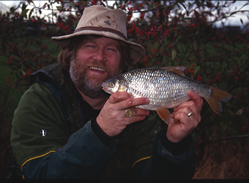 I have been catching fish around the country now for over 30 years so hopefully I've picked up a few useful tips along the way! So what I propose today is to give you my top 5 bait tips to catch more and bigger fish.
I have been catching fish around the country now for over 30 years so hopefully I've picked up a few useful tips along the way! So what I propose today is to give you my top 5 bait tips to catch more and bigger fish.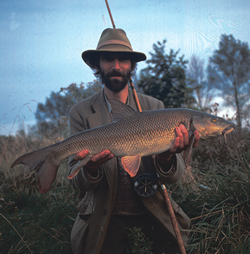 I was chub fishing the other day, sharing the river with a friend as we went from swim to swim, leapfrogging each other in our search for the fish. With stops for lunch and of course the obligatory photographing of the best looking specimen, we must have taken five hours to fish two miles of river.
I was chub fishing the other day, sharing the river with a friend as we went from swim to swim, leapfrogging each other in our search for the fish. With stops for lunch and of course the obligatory photographing of the best looking specimen, we must have taken five hours to fish two miles of river.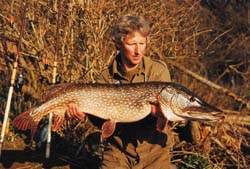
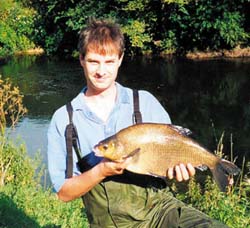
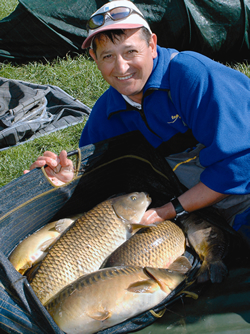 It seems hard to believe that it is only three years ago that the Angling Foundation launched its Nets Accreditation Scheme for keepnets, landing nets and allied equipment. The scheme was formulated because of increasing concern by observant fishery owners over the abrasiveness of certain types of nets and the effect this could be having on their fish.
It seems hard to believe that it is only three years ago that the Angling Foundation launched its Nets Accreditation Scheme for keepnets, landing nets and allied equipment. The scheme was formulated because of increasing concern by observant fishery owners over the abrasiveness of certain types of nets and the effect this could be having on their fish.